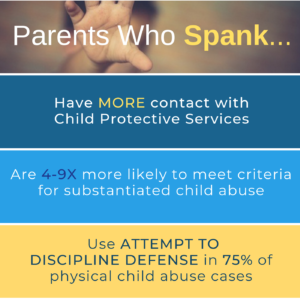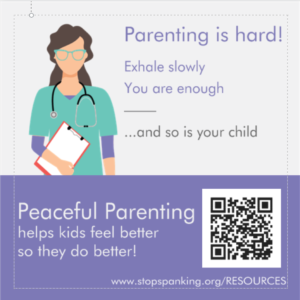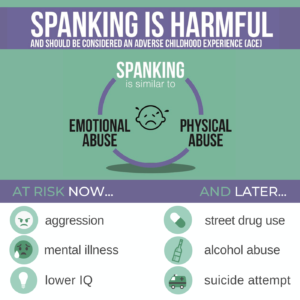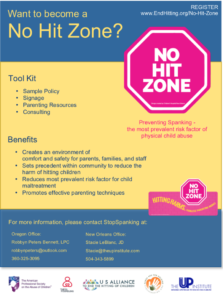Help for Pediatricians
Peaceful Parenting Resource

Parents who spank are at risk.
Let’s solve the problem upstream.
We can prevent child abuse by ending spanking.
The AAP has recently warned that parents should never spank their children. You can help spread the word!
Did you know it is common for children to avoid reporting sexual abuse for fear of being spanked?
Parents Listen to Their Pediatricians…
-
Parents are most likely to seek and trust parenting advice from their pediatrician (Taylor, 2016)
-
Sharing the research on the harms of spanking helps reduce parents’ support of spanking (Holden, 2014)
Support for your Patients
Need an Easy Way to Share the Harms of Spanking?
Simply hand parents a helper card!
These cards link to online resources so parents can…
-
Surf excellent parenting websites
-
Join a LIVE Facebook parenting support groups
-
Watch a free webinar on peaceful parenting
The helper cards help you respond to the recent policy statement issued by the AAP that considers spanking the most prevalent risk for child abuse and urges pediatricians to educate parents on healthier and safer alternatives!
Support for you!
Does the research warrant making a clear statement against spanking?
The research is clear that spanking puts children at risk for emotional & physical abuse, increased aggression and a myriad of other problems. For a quick review, click the RESEARCH LINK. The CDC now considers spanking a health risk (p. 18) and has made a formal statement against spanking calling for educational outreach and legislative action to end its practice. Research tells us that most pediatricians believe physical punishment is harmful, but worry they are in the minority. Rest assured. You are not in the minority.
The American Academy of Pediatrics recommendation: Do not use spanking, hitting, slapping, threatening, insulting, humiliating, or shaming.
Policy Highlights:
-
Spanking linked to increased aggression, poor parent-child bond, anxiety, alcohol/drug abuse, mental health and cognition problems
-
Spanking is considered an ACE, with adverse outcomes similar to those in children who have been overtly abused or neglected.
-
Spanking with verbal abuse associated with changes in brain anatomy using MRI.
-
Harvard Med School study found 14-19% less gray matter in brains of children who were spanked.
Mothers with High ACEs More Likely to Spank
In “Parenting Attitudes and Infant Spanking: The Influence of Childhood Experiences,” the authors interviewed 1,265 mostly low-income women during their first prenatal care visit and 3 and 11 months after they gave birth. The new mothers provided information about their attitudes toward corporal punishment and about their own childhoods, including any experiences of violence or other adverse childhood experiences. During the third interview, the mothers also provided information about how often they spanked their infants. Researchers found that 14% of mothers in this group spanked their infants, and 19% valued corporal punishment for infants. Mothers who had experienced physical abuse as a child were 1.5 times more likely to spank. More adverse childhood experiences were related to a greater propensity to spank.
Spanking is an ACE (Article of the Year)
The official journal of The International Society of the Prevention of Child Abuse & Neglect (ISPCAN) . This paper was chosen as Article of the Year out of the 238 manuscripts published in Child Abuse & Neglect in 2017. The criteria for the award are: a) novel nature of the paper, b) potential to advance the field, and c) high academic quality. Afifi, T.O., Ford, D., Gershoff, E., Merrick, M., Grogan-Kaylor, A., Ports, K.A., MacMillan, H.L., Holden, G.W., Taylor, C.A., Lee, S.J., & Peters Bennett, R. (2017). Spanking and adult mental health impairment: The case for the designation of spanking as an adverse childhood experience, Child Abuse & Neglect, 71, 24-31.
Need quick tips to offer parents?
The first step in addressing challenging behavior is to connect with the child. This helps the parent and child feel more regulated and more capable of solving the problem. You can help parents learn how to use connecting words. The saying, “connect and then redirect” is so true. Words are important. If you struggle to find helpful phrases that support parents in connecting with their children, check out Lori Petro’s “connecting words” page. Print it out and post it on your office wall.
Resources for Your Waiting Room
-
Post “connecting words” posters in the waiting rooms (TeachThroughLove has a ton of great examples)
-
Provide free videos on how to problem solve with children and address common behavioral challenges.
Support for your Clinic







